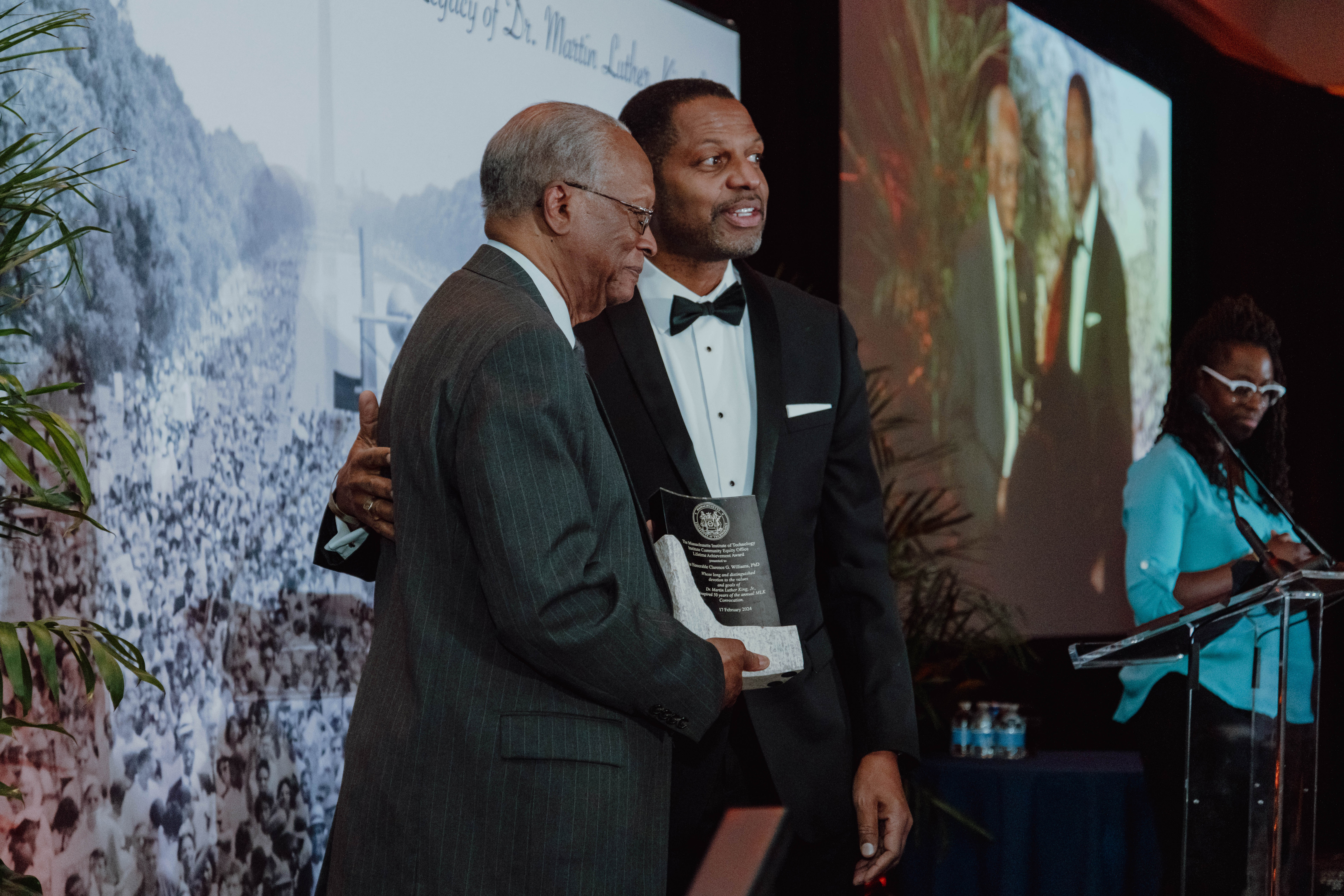
Now in its 50th year, the annual event featured remarks from MIT community members and civil rights activist Janet Moses.
Angie Chatman | MIT News correspondent
After a week of festivities around campus, members of the MIT community gathered Saturday evening in the Boston Marriott Kendall Square ballroom to celebrate the life and legacy of Martin Luther King Jr. Marking 50 years of this annual celebration at MIT, the gala event’s program was loosely organized around a line in King’s essay, “The Purpose of Education,” which he penned as an undergraduate at Morehouse College:
“We must remember that intelligence is not enough,” King wrote. “Intelligence plus character — that is the goal of true education.”
Senior Myles Noel was the master of ceremonies for the evening and welcomed one and all. Minister DiOnetta Jones Crayton, former director of the Office of Minority Education and associate dean of minority education, delivered the invocation, exhorting the audience to embrace “the fiery urgency of now.” Next, MIT President Sally Kornbluth shared her remarks.
She acknowledged that at many institutions, diversity and inclusion efforts are eroding. Kornbluth reiterated her commitment to these efforts, saying, “I want to be clear about how important I believe it is to keep such efforts strong — and to make them the best they can be. The truth is, by any measure, MIT has never been more diverse, and it has never been more excellent. And we intend to keep it that way.”
Kornbluth also recognized the late Paul Parravano, co-director of MIT’s Office of Government and Community Relations, who was a staff member at MIT for 33 years as well as the longest-serving member on the MLK Celebration Committee. Parravano’s “long and distinguished devotion to the values and goals of Dr. Martin Luther King, Jr. inspires us all,” Kornbluth said, presenting his family with the 50th Anniversary Lifetime Achievement Award.
Next, students and staff shared personal reflections. Zina Queen, office manager in the Department of Political Science, noted that her family has been a part of the MIT community for generations. Her grandmother, Rita, her mother, Wanda, and her daughter have all worked or are currently working at the Institute. Queen pointed out that her family epitomizes another of King’s oft-repeated quotes, “Every man is an heir to a legacy of dignity and worth.”
Senior Tamea Cobb noted that MIT graduates have a particular power in the world that they must use strategically and with intention. “Education and service go hand and hand,” she said, adding that she intends “every one of my technical abilities will be used to pursue a career that is fulfilling, expansive, impactful, and good.”
Graduate student Austin K. Cole ’24 addressed the Israel-Hamas conflict and the MIT administration. As he spoke, some attendees left their seats to stand with Cole at the podium. Cole closed his remarks with a plea to resist state and structural violence, and instead focus on relationship and mutuality.
After dinner, incoming vice president for equity and inclusion Karl Reid ’84, SM ’85 honored Adjunct Professor Emeritus Clarence Williams for his distinguished service to the Institute. Williams was an assistant to three MIT presidents, served as director of the Office of Minority Education, taught in the Department of Urban Planning, initiated the MIT Black History Project, and mentored hundreds of students. Reid was one of those students, and he shared a few of his mentor’s oft repeated phrases:
“Do the work and let the talking take care of itself.”
“Bad ideas kill themselves; great ideas flourish.”
In closing, Reid exhorted the audience to create more leaders who, like Williams, embody excellence and mutual respect for others.
The keynote address was given by civil rights activist Janet Moses, a member of the Student Nonviolent Coordinating Committee (SNCC) in the 1960s; a physician who worked for a time as a pediatrician at MIT Health; a longtime resident of Cambridge, Massachusetts; and a co-founder, with her husband, Robert Moses, of the Algebra Project, a pioneering program grounded in the belief “that in the 21st century every child has a civil right to secure math literacy — the ability to read, write, and reason with the symbol systems of mathematics.”
A striking image of a huge new building planned for New York City appeared on the screen behind Moses during her address. It was a rendering of a new jail being built at an estimated cost of $3 billion. Against this background, she described the trajectory of the “carceral state,” which began in 1771 with the Mansfield Judgement in England. At the time, “not even South Africa had a set of race laws as detailed as those in the U.S.,” Moses observed.
Today, the carceral state uses all levels of government to maintain a racial caste system that is deeply entrenched, Moses argued, drawing a connection between the purported need for a new prison complex and a statistic that Black people in New York state are three times more likely than whites to be convicted for a crime.
She referenced a McKinsey study that it will take Black people over three centuries to achieve a quality of life on parity with whites. Despite the enormity of this challenge, Moses encouraged the audience to “rock the boat and churn the waters of the status quo.” She also pointed out that “there is joy in the struggle.”
Symbols of joy were also on display at the Gala in the forms of original visual art and poetry, and a quilt whose squares were contributed by MIT staff, students, and alumni, hailing from across the Institute.
Quilts are a physical manifestation of the legacy of the enslaved in America and their descendants — the ability to take scraps and leftovers to create something both practical and beautiful. The 50th anniversary quilt also incorporated a line from King’s highly influential “I Have a Dream Speech”:
“One day, all God’s children will have the riches of freedom and the security of justice.”
